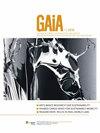Building pathways between transdisciplinarity and transformation: Lessons from practice
IF 1.9
4区 社会学
Q4 ENVIRONMENTAL SCIENCES
Gaia-Ecological Perspectives for Science and Society
Pub Date : 2023-05-20
DOI:10.14512/gaia.32.1.10
引用次数: 1
Abstract
The notion of “transformation” has moved from academic discussion and is now part of the discourse of public and private organizations. Here, we offer a systematic examination of how combining transformation and transdisciplinary approaches can support the transformation to sustainability.In recent years, the notion of “transformation” has moved from academia to the strategic agendas of public and private organizations. Within this discourse, both transdisciplinarity and co-production are often mentioned as means to enable transformation, particularly in debates about risks and opportunities in transformative science and problem-solving. However, there has been little systematic examination of the potential in combining these approaches to contribute more effectively in the transformation to sustainability. Building on an autoethnographic analysis of two projects in transformation and transdisciplinarity, we identify pathways to strengthen collaboration between these approaches: 1. moving from transdisciplinarity “for” transformation to transdisciplinarity “as” transformation and 2. identifying concrete spaces for conceptual and methodological cross-fertilization between these approaches. We discuss the challenges and elaborate recommendations for these pathways and conclude by offering a few insights on how communities can together foster effective sustainability solutions to societal challenges.建立跨学科和转型之间的途径:来自实践的教训
“转型”的概念已经从学术讨论中转移出来,现在已经成为公共和私人组织话语的一部分。在这里,我们对转型和跨学科方法相结合如何支持向可持续性转型进行了系统的研究。近年来,“转型”的概念已从学术界转移到公共和私营组织的战略议程上。在这一论述中,跨学科和合作生产经常被提及为实现变革的手段,特别是在关于变革科学和解决问题的风险和机遇的辩论中。然而,很少有系统地研究将这些方法结合起来以更有效地促进向可持续性转变的潜力。基于对转型和跨学科两个项目的民族志分析,我们确定了加强这些方法之间合作的途径:1。从跨学科走向“转型”为“转型”。确定这些方法之间概念和方法交叉融合的具体空间。我们讨论了这些挑战,并为这些途径提出了详细的建议,最后就社区如何共同培养有效的可持续性解决方案来应对社会挑战提供了一些见解。
本文章由计算机程序翻译,如有差异,请以英文原文为准。
求助全文
约1分钟内获得全文
求助全文
来源期刊

Gaia-Ecological Perspectives for Science and Society
ENVIRONMENTAL SCIENCES-
CiteScore
2.30
自引率
18.80%
发文量
43
审稿时长
>12 weeks
期刊介绍:
GAIA is a peer-reviewed inter- and transdisciplinary journal for scientists and other interested parties concerned with the causes and analyses of environmental and sustainability problems and their solutions.
Environmental problems cannot be solved by one academic discipline. The complex natures of these problems require cooperation across disciplinary boundaries. Since 1991, GAIA has offered a well-balanced and practice-oriented forum for transdisciplinary research. GAIA offers first-hand information on state of the art environmental research and on current solutions to environmental problems. Well-known editors, advisors, and authors work to ensure the high quality of the contributions found in GAIA and a unique transdisciplinary dialogue – in a comprehensible style.
 求助内容:
求助内容: 应助结果提醒方式:
应助结果提醒方式:


